Today Current Affairs: 27th December 2021 for UPSC IAS exams, State PSC exams, SSC CGL, State SSC, RRB, Railways, Banking Exam & IBPS, etc
Table of Contents
Young India’s Aspiration Worries:
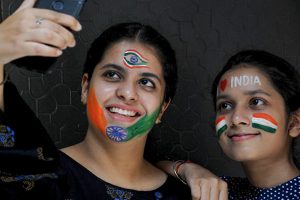
A recent report released by Lokniti-CSDS in collaboration with Konrad Adenauer Stiftung, which interviewed 6,277 youth aged 15-34 across 18 states in July-August 2021, offers insights on their career aspirations, job preferences and expectations, their opinions on institutions of kinship, and their mental health.
- Occupation status: Two-fifths (39%) of India’s youth identify themselves as students. While more young men (39%) compared to young women (11%) were working, a higher proportion of young women (42%) were studying than young men (36%).
- Employment: More than half (55%) said they would prefer a government job; a quarter (24%) would prefer to start their own business.
- Many youth are now marrying at a later age than before. The study indicates that the proportion of married youth has decreased by 13 percentage points since 2007 and five percentage points since 2016. In the present study, 42% said they are married.
- Youth showed a greater acceptance for the idea of inter-caste marriage than for inter-religious marriage.
- Mental health: The study found that the family’s financial security worried the youth the most, followed by their own health.
- About six in ten (56%) worried about their jobs, and more than half (54%) about their physical appearance.
UAE’s Golden Visa:

Bollywood actor Tusshar Kapoor awarded Golden Visa.
- He joins a growing list of Indian movie stars, including Mohanlal and Shah Rukh Khan, who have received the coveted 10-year residency.
- In 2019, the United Arab Emirates (UAE) implemented a new system for long-term residence visas, thereby enabling foreigners to live, work and study in the UAE without the need of a national sponsor and with 100 per cent ownership of their business.
- The Golden Visa system essentially offers long-term residency (5 and 10 years) to people belonging to the following groups:
- investors, entrepreneurs, individuals with outstanding talents the likes of researchers, medical professionals and those within the scientific and knowledge fields, and remarkable students.
Eligibility requirements (Have a brief overview; need not mug up):
For investors:
- A deposit of at least AED (United Arab Emirates Dirham) 10 million worth of public investment, either in the form of an investment fund or a company.
- 60% of the total investment must not be in the form of real estate.
- The invested amount must not be loaned, or in case of assets, investors must assume full ownership.
- The investor must be able to retain the investment for a minimum of three years.
- May be extended to include business partners, providing that each partner contributes AED 10 million.
- Can also include the holder’s spouse and children, as well as one executive director and one advisor.
For individuals with specialized talents:
- The category includes doctors, researchers, scientists, investors and artists. These individuals may be granted a 10-year visa following accreditations granted by their respective departments and fields. The visa also extends to their spouses and children.
Eligibility for a 5-year visa:
- The investor must invest in a property of a gross value of not less than AED 5 million.
- The amount invested in real estate must not be on loan basis.
- The property must be retained for at least three years.
Outstanding students:
- Outstanding students with a minimum grade of 95% in public and private secondary schools.
- University students within and outside the country having a distinction GPA of at least 3.75 upon graduation.
Flex Fuel Vehicles:
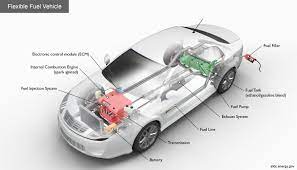
Union Minister of Road Transport and Highways, Nitin Gadkari, has for long been advocating the use of flex-fuel to power cars and motorcycles sold in India.
- Recently, at an industry event, the transport minister revealed that he has issued an advisory to all carmakers to introduce flex-fuel engines in their vehicles.
- Carmakers are given six months’ time to introduce flex-fuel engines.
- Manufacturers have to produce the Flex Fuel Strong Hybrid vehicles and both types of vehicles must comply with the BS-6 emission norms.
Flexible fuel vehicles (FFVs):
- An FFV is a modified version of vehicles that could run both on gasoline and doped petrol with different levels of ethanol blends.
- FFVs will allow vehicles to use all the blends and also run on unblended fuel.
- FFVs have compatible engines to run on more than 84 percent ethanol blended petrol.
- FFVs are aimed at reducing the use of polluting fossil fuels and cutting down harmful emissions.
- Alternative fuel ethanol is Rs 60-62 per litre while petrol costs more than Rs 100 per litre in many parts of the country, so by using ethanol, Indians will save Rs 30-35 per litre.
- For India, FFVs will present a different advantage as they will allow vehicles to use different blends of ethanol mixed petrol available in different parts of the country.
- Also, these vehicles are a logical extension of the Ethanol Blended Petrol (EBP) programme launched by the Union Ministry of Petroleum and Natural Gas in January 2003.
- Since India has surplus produce of corn, sugar and wheat, the mandatory blending of ethanol programme will help farmers in realising higher incomes.
- For the overall Indian economy, higher usage of ethanol as an automobile fuel will help save import costs as the country meets more than 80 per cent of its crude oil requirements through imports.
P.N. Panicker:

The President of India recently unveiled the statue of Shri P.N. Panicker at Poojappura, Thiruvananthapuram.
P.N. Panicker (1909-1995):
- Puthuvayil Narayana Panicker is known as the Father of the Library Movement of Kerala.\
- June 19, his death anniversary, has been observed in Kerala as Vayanadinam (Reading Day) since 1996.
- In 2017, PM declared June 19, Kerala’s Reading Day, as National Reading Day in India. The following month is also observed as National Reading Month in India.
- Panicker led the formation of Thiruvithaamkoor Granthasala Sangham (Travancore Library Association) in 1945 with 47 rural libraries.
- The slogan of the organization was ‘Read and Grow’.
- The association – Grandhasala Sangham won the prestigious ‘Krupsakaya Award’ from UNESCO in 1975.
Olive Ridley Turtles:

Researchers of the Zoological Survey of India (ZSI) are carrying out tagging of the Olive Ridleys at three mass nesting sites — Gahirmatha, Devi River mouth and Rushikulya.
- The tagging would help them identify the migration path and places visited by the marine reptiles after congregation and nesting.
- The Olive ridley turtles are the smallest and most abundant of all sea turtles found in the world.
- They inhabit warm waters of the Pacific, Atlantic and Indian oceans.
- These turtles, along with their cousin the Kemps ridley turtle, are best known for their unique mass nesting called Arribada, where thousands of females come together on the same beach to lay eggs.
- Rushikulya rookery coast in the Ganjam district of Odisha, Gahirmatha beach and the mouth of the Debi River, are the major nesting sites in Odisha.
- IUCN status: Vulnerable.
- Every year, the Indian Coast Guard’s “Operation Olivia”, initiated in the early 1980s, helps protect Olive Ridley turtles as they congregate along the Odisha coast for breeding and nesting from November to December.
Comprehensive Economic Cooperation Agreement (CECA):
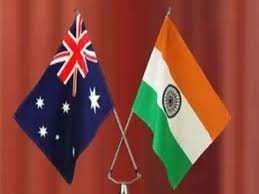
India and Australia are fast-tracking negotiation regarding the bilateral Comprehensive Economic Cooperation Agreement (CECA).
- India’s exports to Australia amounted to $4.04 billion while imports were $8.24 billion in FY21.
- Major Indian exports to Australia are petroleum products, medicines, polished diamonds, gold jewellery, apparel etc, while key Australian exports to India include coal, LNG, alumina and non-monetary gold.
- In services, major Indian exports include travel, telecom and computer, government and financial services, while Australian services exports were principally in education and personal travel.
- In 2020, India was Australia’s seventh-largest trading partner and sixth largest export destination, driven by coal and international education.
Meendum Manjappai’ Scheme: Tamil Nadu
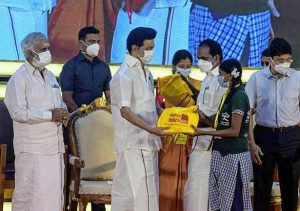
Tamil Nadu Chief Minister M.K. Stalin has launched the ‘Meendum Manjappai’ campaign aimed at creating awareness on the usage of cloth bags instead of single-use plastic bags.
- The Tamil Nadu government has already banned 14 types of plastic materials.
- The government also needs to address important structural issues such as policies to regulate the use of plastic alternatives, improve recycling and have better waste segregation management.
- In addition to improving recyclability, investment in research and development for alternatives should also be a priority.
- Single-use plastics refer to disposable items like grocery bags, food packaging, bottles and straws that are used only once before they are thrown away, or sometimes recycled.
- As plastic is cheap, lightweight and easy to produce, it has led to a production boom over the last century, and the trend is expected to continue in the coming decades, according to the United Nations.
- But countries are now struggling with managing the amount of plastic waste they have generated.
- About 60% of plastic waste in India is collected — that means the remaining 40% or 10,376 tons remain uncollected
- In 2019, the Union government in a bid to free India of single-use plastics by 2022, had laid out a multi-ministerial plan to discourage the use of single-use plastics across the country.
- A government committee has identified the single use plastic (SUP) items to be banned based on an index of their utility and environmental impact. It has proposed a three-stage ban:
- The first category of SUP items proposed to be phased out are plastic sticks used in balloons, flags, candy, ice-cream and ear buds, and thermocol that is used in decorations.
- The second category, proposed to be banned from July 1, 2022, includes items such as plates, cups, glasses and cutlery such as forks, spoons, knives, straws, trays; wrapping and packing films used in sweet boxes; invitation cards; cigarette packets; stirrers and plastic banners that are less than 100 microns in thickness.
- A third category of prohibition is for non-woven bags below 240 microns in thickness. This is proposed to start from September next year.
Tablighi Jamaat:

The Islamic missionary organisation made headlines again this month as it was banned by the Kingdom of Saudi Arabia.
Literally, it means a society for spreading the faith. It is a conservative Muslim organisation.
- It is a Sunni Islamic missionary movement.
- The aim is to reach out to ordinary Muslims and revive their faith, particularly in matters of ritual, dress, and personal behaviour.
- It has significant base in various countries including Bangladesh, Pakistan, United States, Britain, Indonesia, Malaysia, and Singapore.
- Launched by prominent Islamic scholar Maulana Muhammad Ilyas Khandhalaw in 1926 in Mewat (Haryana).
- Its roots lie in the Deobandi version of the Hanafi school of jurisprudence.
- Maulana Ilyaz trained several young men from Deoband and Saharanpur and sent them to Mewat, where the Tablighi Jamaat established a network of madrasas and Mosque.
The Tablighi Jamaat is based on six principles:
- Kalimah, an article of faith in which the Tabligh accepts that there is no God but Allah and that Prophet Muhammad is his messenger.
- Salaat, or prayer five times daily.
- Ilm and dhikr, the knowledge and remembrance of Allah conducted in sessions in which the congregation listens to preaching by the imam, performs prayers, recites the Quran and reads the Hadith; the congregation also uses these sessions to dine together, thus fostering a sense of community and identity.
- Ikram-i-Muslim, the treatment of fellow Muslims with honour.
- Ikhlas-i-niyat, or sincerity of intention.
- Dawat-o-tabligh, or proselytisaton.
NMCG-TERI’s Centre Of Excellence (CoE) On Water Reuse:
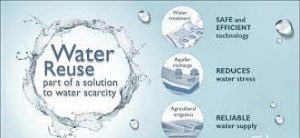
The Director General of National Mission for Clean Ganga (NMCG) and the Director General of The Energy and Resources Institute (TERI) launched the NMCG-TERI’s Centre of Excellence (CoE) on Water Reuse at the TERI Headquarters in New Delhi.
- The CoE on Water Reuse is the first of its kind to be established in the country through a collaboration between NMCG and TERI.
- The Centre is a quadripartite alliance between NMCG, TERI, industry partners and industry representative bodies, to come up at the TERI campus in Gwal Pahari, Gurugram.
- It will be meeting the objectives of the Ganga Knowledge Centre (GKC) to design and foster research and innovation for low-cost, effective and integrated treatment technologies, which could bridge the current treatment gaps, augment capacities and provide safe treated water for reuse.
- Hence this CoE is also the first of its kind that will match the activities envisaged under GKC.
ABHYAS:
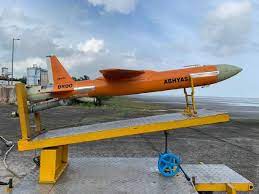
DRDO has successfully conducted the flight test of Indigenously developed High-speed Expendable Aerial Target (HEAT) ‘Abhyas’ from Integrated Test Range at Chandipur off the coast of Odisha.
- The vehicle can be used as an aerial target for evaluation of various missile systems.
- This indigenous target aircraft, once developed, will meet the requirements of High-speed Expendable Aerial Targets (HEAT) for Indian Armed Forces.
- ABHYAS is designed & developed by DRDO’s Aeronautical Development Establishment (ADE), Bengaluru. The air vehicle is launched using twin under-slung boosters which provide the initial acceleration to the vehicle.
- It is powered by a gas turbine engine to sustain a long endurance flight at subsonic speed.
- The target aircraft is equipped with MEMS based Inertial Navigation System (INS) for navigation along with the Flight Control Computer (FCC) for guidance and control.
- The vehicle is programmed for fully autonomous flight. The check-out of air vehicle is done using laptop-based Ground Control Station (GCS).
Tiananmen Square Massacre:

Workers at the University of Hong Kong put took down the towering “Pillar of Shame”.
- The 8-metre (26-foot)-tall sculpture, which was taken away in parts, remembered the victims of China’s 1989 crackdown on pro-democracy protests at Beijing’s Tiananmen Square.
- There is more than one Pillar of Shame. It is a series of works by Danish sculptor Jens Galschioet, all the same height and typically made of bronze, copper and concrete.
- They have been erected in Hong Kong, Mexico and Brazil, and are designed to remind people of events to ensure they don’t happen again.
Tiananmen Square Massacre:
- The Tiananmen Square protests, known as the June Fourth Incident in China, were student-led demonstrations held in Tiananmen Square, Beijing during 1989.
- In what is known as the Tiananmen Square Massacre, troops armed with assault rifles and accompanied by tanks fired at the demonstrators and those trying to block the military’s advance into Tiananmen Square.
- The protests started on 15 April and were forcibly suppressed on 4 June when the government declared martial law and sent the People’s Liberation Army to occupy parts of central Beijing.
- Estimates of the death toll vary from several hundred to several thousand.
Karnataka Right To Freedom Of Religion Bill, 2021:

The Karnataka legislative Assembly passed The Karnataka Right to Freedom of Religion Bill, 2021, commonly referred to as the anti-conversion Bill, amid Opposition protests. The Bill will now go to the Karnataka Legislative Council.
- It prohibits conversion from one religion to another by misrepresentation, force, fraud, allurement or marriage.
- It, however, provides an exemption in the case of a person who “reconverts to his immediate previous religion” as “the same shall not be deemed to be a conversion under this Act”.
- Complaints regarding conversions can be filed by family members or any other person who is related to the individual who is getting converted.
- A jail term of three to five years and a fine of Rs 25,000 has been proposed for those violating the law in the case of people from general categories, and a jail term of three to 10 years and a fine of Rs 50,000 has been mooted for those converting minors, women or persons from SC/ST communities.
- The Bill also envisages payment of a compensation of Rs 5 lakh (on court orders) to victims of conversion by the persons attempting the conversion, and double punishment for repeat offences.
TRIFED Vandhan Chronicle:
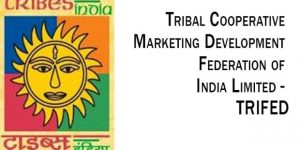
TRIFED Vandhan Chronicle was launched by Arjun Munda, Minister for Tribal Affairs on December 23, 2021.
- TRIFED VanDhan Chronicle is an in-depth resource on the Van Dhan Yojana and TRIFED’s activities in this important scheme.
- The chronicle gives an in-depth illustration of the activities undertaken by TRIFED which has impacted the life of almost 16 lakh tribals; including the introduction of Minimum Support Price (MSP) for select forest produces.
- Over the past two years, The ‘Mechanism for Marketing of Minor Forest Produce (MFP) through Minimum Support Price (MSP) & Development of Value Chain for MFP’ has impacted the tribal ecosystem in a major way.
- The Van Dhan tribal start-ups, a component of the same scheme, has emerged as a source of employment generation for tribal gatherers and forest dwellers and the home-bound tribal artisans.
- In less than two years, 52,976 Van Dhan Self Help Groups (VDSHGs), subsumed into 3110 Van Dhan Vikas Kendra Clusters (VDVKCs) of 300 forest dwellers each, have been sanctioned by TRIFED.
INS Khukri:
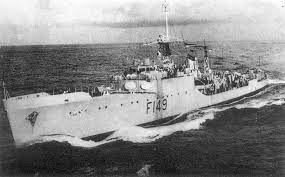
INS Khukri, the first of the indigenously built Missile Corvettes, was decommissioned after 32 years of glorious service on 23 Dec 2021. The ship solemn ceremony was held at Visakhapatnam.
- The corvette was built by the Mazagaon Dock Shipbuilders on 23 August 1989 and had the distinction of being part of both the Western and Eastern Fleets.
- During her service, the ship was commanded by 28 Commanding Officers and traversed a distance of over 6,44,897 nautical miles, which is equivalent to navigating around the world 30 times or 3 times the distance between the Earth and the Moon.
- The ship was affiliated with the Gorkha Brigade of the Indian Army.




